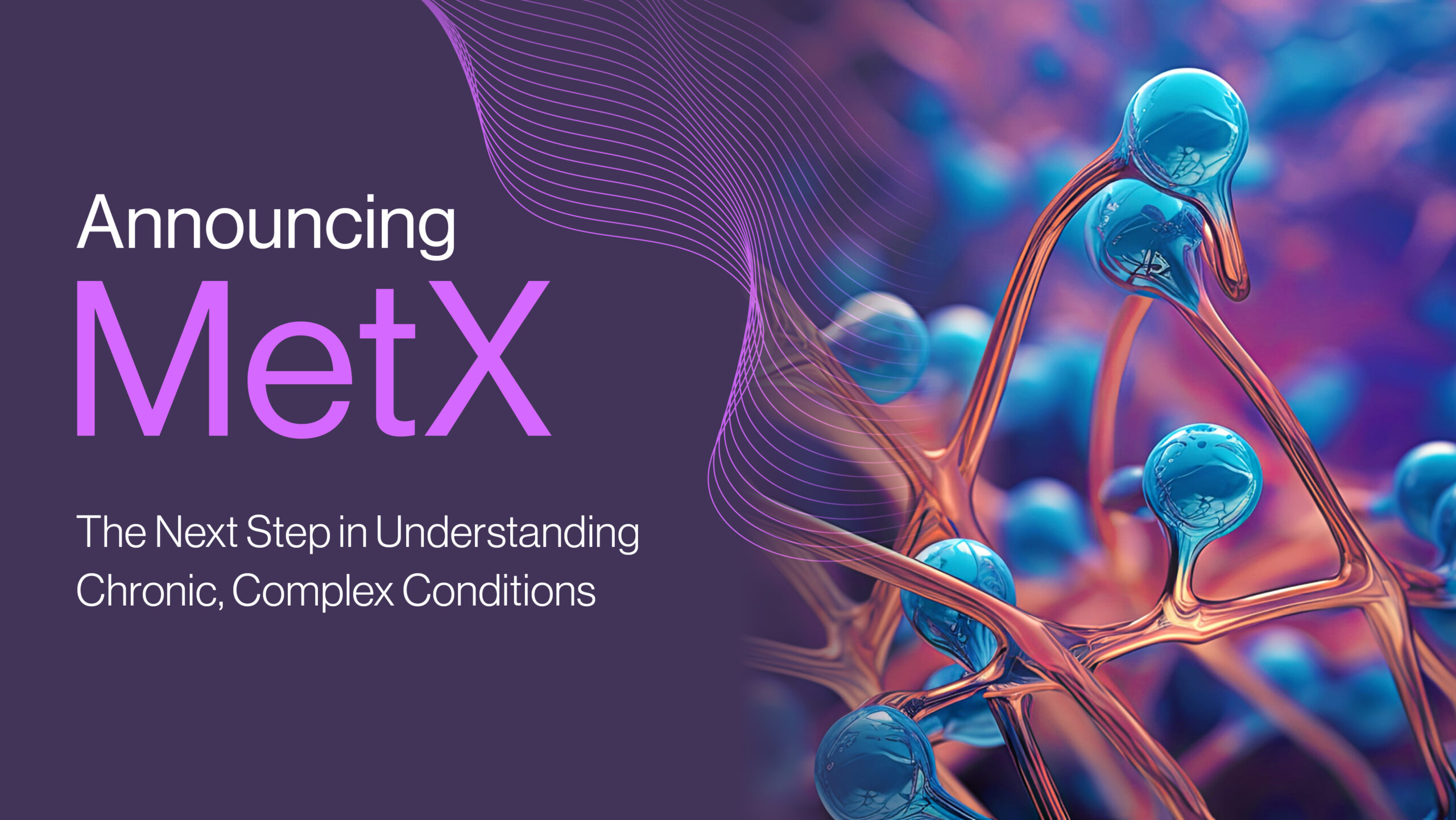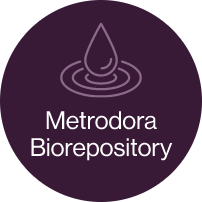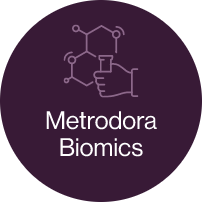Metrodora Blog
April 2024

A year ago, the Metrodora Institute launched to break down the silos between specialties of medicine and between research and clinical care. Our goal was to create a blueprint for how chronic, complex conditions should be treated.
Since Metrodora opened its doors in Salt Lake City, we have seen hundreds of patients over thousands of visits, launched clinical trials for promising drugs like argenx’s efgartigimod, partnered with PrecisionLife to analyze and better cluster these patients and develop predictive diagnostic tests, and so much more.
Today, we’re going even further by announcing the launch of MetX — MetX is being funded by a $1M grant from the Metrodora Foundation and our visionary donors.
The problem
Today, over 73 million people suffer from chronic, complex conditions that cause a constellation of debilitating symptoms across the nervous and immune systems. And with the rise of Long COVID, this number keeps climbing. A staggering 14% of the U.S. population reports long-term symptoms following COVID infections, and the burden of disease for these conditions is massive.
The problem is that these conditions aren’t being studied at the level of other harmful diseases. Take Myalgic Encephalomyelitis/Chronic Fatigue Syndrome (ME/CFS), for example. Research shows that the disease burden of ME/CFS is double that of HIV/AIDS, yet ME/CFS is more underfunded relative to its disease burden than any other disease.
As a result, many patients with chronic, complex conditions bounce from specialist to specialist with no one looking at the full picture of their health. And since these complex diseases are so poorly understood, they’re often dismissed by the healthcare system.
What’s missing
If these conditions are so prevalent, why aren’t more pharma companies developing drugs for them? When we asked them, the answer was loud and clear: the scientific research and understanding of these diseases is often not robust enough to justify taking the risk to prioritize these conditions.
As it stands now, there are only a handful of clinicians who really understand these diseases, which means they’re often overwhelmed by patients and have little to no time to conduct studies. The studies they do conduct are very narrow in scope, and take a long time to go from patient recruitment to publishing.
This helps explain why researchers are usually forced to start over every time they do a study in this space — sourcing patients, collecting biological samples, and building data sets from scratch. The result is a fractured, fragmented understanding of complex conditions that does not create the core, foundational evidence needed to develop cures. In fact, many diseases have names that simply reflect the symptoms patients have as opposed to the biological drivers behind the diseases themselves (“Chronic Fatigue Syndrome” is a perfect example).
“The lack of technology platforms to support the collection of real-world data matched to biological testing remains a major gap in accelerating data-driven insights for clinicians and pharma partners. In the age of AI, this is a major problem for training and validating new diagnostic tools and identifying drug targets.”
—Rohit Gupta, Chief Scientific Office of Metrodora Institute
The deficiency of foundational research and well-characterized data on these conditions is why so few pharma companies prioritize these conditions over ones with more detailed understanding of biological drivers of disease, despite the enormous unmet need.
“Having spent more than a decade working at large tech companies, I understood early the need for large and well-characterized data sets to build upon. While it might seem like the less sexy thing to prioritize when it comes to disease research, it was clear to me that without this strong data foundation, we would never see the progress we hoped to catalyze across the whole industry.”
— Fidji Simo, Co-Founder, Metrodora Institute, President, Metrodora Foundation

How MetX can help
MetX is made up of three pillars designed to solve these problems: Metrodora Connect, Metrodora Biorepository, and Metrodora Biomics.

Patient Engagement & Real World Data Collection Technology
- Historical Electronic Health Records (EHR’s)
- Patient-reported surveys: longitudinal symptoms & intervention tracking
- Biometric data from wearables

First high-integrity biobank and data repository for neuroimmune access disorders
- Biofluids
- Solid tissue
- Pathology blocks & images

Deep, longitudinal biological analyses utilizing latest technologies
- Whole genome sequencing: combinatorial genetics, with return of results to patients for genetic counseling.
- Deep immune-profiling.
- Advanced histology
Metrodora Connect

Metrodora Connect is a digital health toolkit, launched in partnership with CareEvolution, that pulls together data from every part of a patient’s journey — from fully integrated medical records, to longitudinal symptom and intervention tracking, to biometrics data from personal wearables, questionnaires, and biomechanical data for researchers. This engaging tool turns patients into true partners in our research and allows them to take an active role in sharing data, tracking their symptoms, participating in surveys and more.
Metrodora Biorepository

Metrodora Biorepository hosts the most advanced collections of biological specimens from participants—blood, urine, stools, tissues and more— collected longitudinally, and helps unlock advances in genetic, antibody and cellular therapies.
Metrodora Biomics

Finally, Metrodora Biomics uses these biospecimens and data to unlock progress. We’re partnering with the most advanced and emerging technologies in genetics, epigenetics, gene expression, proteins, metabolites, and cellular analyses — and using the latest advances in AI to analyze datasets at a scale that’s never been possible before.
- For example, through our partnership with PrecisionLife, we’re using whole genome sequencing to identify how the combinations of mutations across multiple genes are associated with symptoms common in chronic illnesses. Eventually, this should allow us to diagnose chronic, complex diseases with clarity that exceeds that of BRCA1 for breast cancer.
- Thanks to our partnership with Teal Omics — building on the research of Dr. Wyss-Coray — we also have a way of exploring proteins associated with specific organs to better understand their biological age. When combined with a person’s genetics, this allows us to detect, and hopefully prevent, chronic, complex illnesses earlier.
- Through these initiatives, we intend to do the following: Return results to patients, such as genetic sequencing and immune profiling with interpretations to improve clinical care.
- Reclassify diseases based on what’s happening biologically, not just symptoms, and create different clusters of patients that can then receive more specific treatments.
- Find objective biomarkers that help develop clear diagnostic tests over time.
- Create a foundational understanding that allows the biopharma industry to better identify drug targets and develop therapeutics.
- Help the industry find the right groups of patients that are most likely to see positive impact from a drug based on their biology — thereby increasing the chances of success for clinical trials.
What’s next
Over the next few years, we plan to expand MetX to thousands of patients, and perform an even deeper analysis of their data — helping providers better diagnose disease, making it easier to rapidly deploy trials to repurpose drugs, and giving pharma companies the information they need to identify new drug targets.
An initiative of this magnitude can’t be done alone. This is why Metrodora seeks to work with the best-in-class disease research foundations in this space to bring landmark, harmonized data together. Metrodora and these expert foundations are exploring partnerships to jointly move the ecosystem forward via patient engagement, the launch of clinical trials, and the development of diagnostic tools. We’re joined by the following foundations who bring complementary expertise to the table that will spur transformative progress for our collective patient community.
- Solve ME/CFS, who has been advocating for ME/CFS for years and played a key leadership role in the recognition of ME/CFS and Long-Covid as an enormous, unaddressed medical need.
- Open Medicine Foundation, who has advanced important research and medical education initiatives for the ME/CFS and Long-Covid community.
- Food Allergy Science Initiative (FASI), who is addressing the expansive public health threat of food allergy.
- The Ehlers-Danlos Society, who has strengthened education and research for patients living with Ehlers-Danlos syndromes and hypermobility spectrum disorders.
- Sjogren’s Foundation, who has driven meaningful advancements in Sjögren’s research and education.
- Brain Inflammation Collaborative, who is focused on uncovering the solutions needed for better diagnosis, treatment and prevention of mental and physical health symptoms triggered by neuroinflammation.
Patients want access to the best care available today, but they also want to help discover the cures of tomorrow. At Metrodora Foundation, we partner with patients as well as the rest of the industry on transformative research to help accelerate the path to cures — and with the launch of MetX, we are one step closer on that journey.
To learn more about joining the MetX study, please visit: research.metrodora.co.
Please visit metrodora.org to support current and future research – including MetX – for patients living with chronic, complex conditions.
